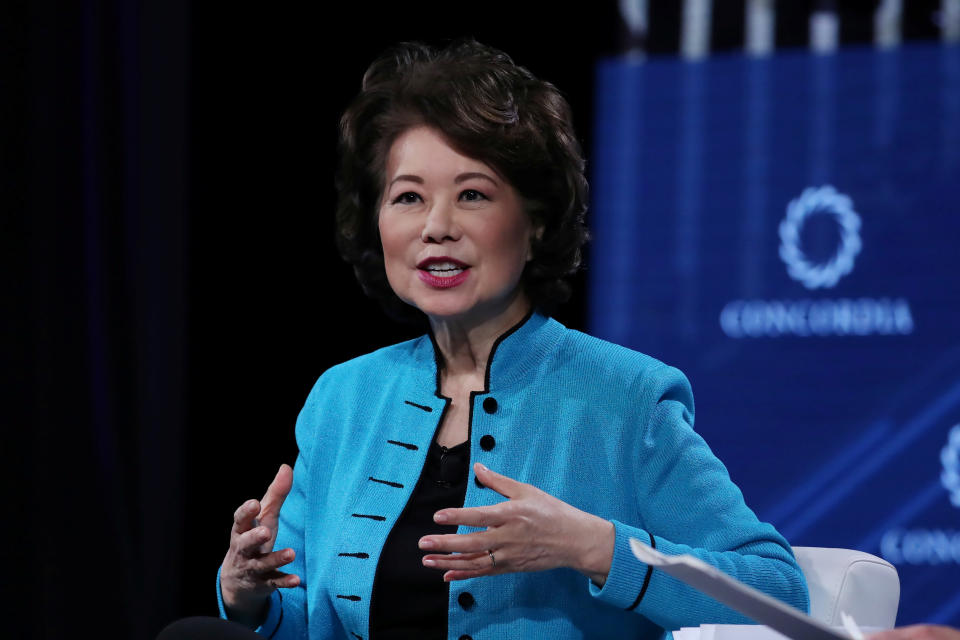Elaine Chao describes people's biggest complaints about drones
Drones have quickly gone from a novelty used by enthusiasts to an everyday part of our lives used by everyone from farmers and surveyors to emergency services workers and photographers.
But as they've become more ubiquitous, drones have introduced some unique issues, including privacy concerns and noise issues.
"We get a lot of complaints about people who don't want to see drones outside their second-floor window, let's say, or third-floor window," Secretary of Transportation Elaine Chao told Yahoo Finance Editor-in-Chief Andy Serwer during an interview at the World Economic Forum in Davos, Switzerland.
It's not just privacy and noise, though. Chao, whose department oversees the Federal Aviation Administration (FAA), says drone security is also among the major issues the federal government continues to examine.
A new workforce
Chao, who served as the Secretary of Labor under George W. Bush from 2001 until 2009, says the proliferation of drones has helped create 150,000 jobs for professional drone operators, a category of work that didn't exist when she held her previous position.
"So now drones are getting bigger, heavier, they have more capacity to carry either freight or potentially human beings. So we're talking about air taxis, and we're talking about all sorts of humans in flight in drones," she said.

With the growth of the drone industry, Chao explained, the FAA has had to focus on a few key areas of governance including safety and security, and privacy. As far as safety and security go, Chao said the FAA has to ensure that the drones that are flying over our heads have the proper cybersecurity protections to prevent them from being used by malevolent actors.
The issue of privacy, though, is something Chao said she has heard about specifically. As consumer-grade drones began to take to the sky, the first crop of complaints related to their use to invade people's privacy began to roll in. Now, Chao said, the increase in the number of drones has raised issues about noise. Dealing with that, she explained, falls under the purview of the FAA.
Knowing who's flying
The FAA currently has a means for commercial and consumer drone owners to register their devices so the government can identify who a drone belongs to. But that system only requires users to physically mark their drones with unique registration numbers. That means the only way for officials to find out who a drone belongs to is to read those numbers, something that's hard to do when a drone is in mid-flight.
In other words, you'd only be able to identify a drone's owner when it crashes, or the owner brings it to the ground.
To address this, Chao said the DOT is proposing a new rule that would require all consumer and commercial drones to be remotely identifiable. That is, you'd be able to somehow read a drone's identifying number from the ground remotely.
It's something that Chao said has drawn interest from both law enforcement and military officials. But the rules are still in their early phase; the public comment period for them is open until March 2. So it could be some time before a remote identification system is put in place.
When it is, though, it could help crack some surprisingly mysterious cases, including the still-unsolved incidents of flocks of drones flying across the night skies in Colorado and Kansas.
"We don't know who they belong to, we don't know who's operating them, to this day we do not," Chao said told Yahoo Finance this week.
More from Dan:
Elaine Chao: We still haven’t identified operators of mystery drones in Colorado and Nebraska
5G will be in every metro area in the US by the end of 2020: Qualcomm president
Cyber expert: 'Bored kids' are committing cyberattacks to avoid tests
An emerging cybersecurity threat could cost lives — not just data
Got a tip? Email Daniel Howley at danielphowley@protonmail.com or dhowley@yahoofinance.com, and follow him on Twitter at @DanielHowley.
Follow Yahoo Finance on Twitter, Facebook, Instagram, Flipboard, SmartNews, LinkedIn, YouTube, and reddit.

 Yahoo Finance
Yahoo Finance 
